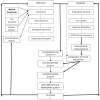A Model of Supervisor Decision-Making in the Accommodation of Workers with Low Back Pain
- PMID: 26811170
- PMCID: PMC4939088
- DOI: 10.1007/s10926-015-9623-0
A Model of Supervisor Decision-Making in the Accommodation of Workers with Low Back Pain
Abstract
Purpose To explore supervisors' perspectives and decision-making processes in the accommodation of back injured workers. Methods Twenty-three semi-structured, in-depth interviews were conducted with supervisors from eleven Canadian organizations about their role in providing job accommodations. Supervisors were identified through an on-line survey and interviews were recorded, transcribed and entered into NVivo software. The initial analyses identified common units of meaning, which were used to develop a coding guide. Interviews were coded, and a model of supervisor decision-making was developed based on the themes, categories and connecting ideas identified in the data. Results The decision-making model includes a process element that is described as iterative "trial and error" decision-making. Medical restrictions are compared to job demands, employee abilities and available alternatives. A feasible modification is identified through brainstorming and then implemented by the supervisor. Resources used for brainstorming include information, supervisor experience and autonomy, and organizational supports. The model also incorporates the experience of accommodation as a job demand that causes strain for the supervisor. Accommodation demands affect the supervisor's attitude, brainstorming and monitoring effort, and communication with returning employees. Resources and demands have a combined effect on accommodation decision complexity, which in turn affects the quality of the accommodation option selected. If the employee is unable to complete the tasks or is reinjured during the accommodation, the decision cycle repeats. More frequent iteration through the trial and error process reduces the likelihood of return to work success. Conclusion A series of propositions is developed to illustrate the relationships among categories in the model. The model and propositions show: (a) the iterative, problem solving nature of the RTW process; (b) decision resources necessary for accommodation planning, and
Keywords: Decision-making; Job accommodation; Qualitative methods; Return-to-work; Supervisor.
(c) the impact accommodation demands may have on supervisors and RTW quality.
Conflict of interest statement
Similar articles
-
Supervisors' perceptions of organizational policies are associated with their likelihood to accommodate back-injured workers.Disabil Rehabil. 2017 Feb;39(4):346-353. doi: 10.3109/09638288.2016.1141245. Epub 2016 Feb 17. Disabil Rehabil. 2017. PMID: 26883582 Free PMC article.
-
Supervisor Autonomy and Considerate Leadership Style are Associated with Supervisors' Likelihood to Accommodate Back Injured Workers.J Occup Rehabil. 2015 Sep;25(3):589-98. doi: 10.1007/s10926-015-9567-4. J Occup Rehabil. 2015. PMID: 25595332 Free PMC article.
-
How Can Supervisors Contribute to the Return to Work of Employees Who have Experienced Depression?J Occup Rehabil. 2018 Jun;28(2):279-288. doi: 10.1007/s10926-017-9715-0. J Occup Rehabil. 2018. PMID: 28660364
-
Human resource management training of supervisors for improving health and well-being of employees.Cochrane Database Syst Rev. 2019 Sep 25;9(9):CD010905. doi: 10.1002/14651858.CD010905.pub2. Cochrane Database Syst Rev. 2019. PMID: 31560414 Free PMC article.
-
The significance of nurse supervisors' different ethical decision-making styles.J Nurs Manag. 2006 Nov;14(8):637-43. doi: 10.1111/j.1365-2934.2006.00710.x. J Nurs Manag. 2006. PMID: 17054737 Review.
Cited by
-
Work as an arena for health-Supervisors' experiences with attending to employees' sick leave and return-to-work process.PLoS One. 2023 Apr 14;18(4):e0284369. doi: 10.1371/journal.pone.0284369. eCollection 2023. PLoS One. 2023. PMID: 37058510 Free PMC article.
-
Obstacles to returning to work with chronic pain: in-depth interviews with people who are off work due to chronic pain and employers.BMC Musculoskelet Disord. 2019 Oct 27;20(1):486. doi: 10.1186/s12891-019-2877-5. BMC Musculoskelet Disord. 2019. PMID: 31656184 Free PMC article.
-
Work ability meetings - Challenges and Resolutions, a survey to Finnish occupational physicians.Work. 2024;79(3):1425-1432. doi: 10.3233/WOR-230331. Work. 2024. PMID: 38995747 Free PMC article.
-
Developing a Work Accommodation Operating Model for Workplaces and Work Ability Support Services.J Occup Rehabil. 2025 Mar;35(1):116-124. doi: 10.1007/s10926-024-10193-z. Epub 2024 Apr 16. J Occup Rehabil. 2025. PMID: 38627265 Free PMC article.
-
Qualitative Assessment of Perceived Organizational Support for Employed Breast Cancer Survivors.J Occup Environ Med. 2023 Oct 1;65(10):868-879. doi: 10.1097/JOM.0000000000002931. Epub 2023 Jul 26. J Occup Environ Med. 2023. PMID: 37488771 Free PMC article.
References
-
- Shaw WS, Robertson MM, Pransky G, McLellan RK. Employee perspectives on the role of supervisors to prevent workplace disability after injuries. Journal of Occupational Rehabilitation. 2003;13:129–42. - PubMed
-
- Crook J, Milner R, IZS, Stringer B. Determinants of occupational disability following a low back injury: a critical review of the literature. Journal of Occupational Rehabilitation. 2002;12(4):277–95. - PubMed
-
- Williams-Whitt K. Impediments to Disability Accommodation. Relations industrielles. 2007;62(3):405–532.
-
- Shaw WS, Robertson MM, McLellan RK, Verma SK, Pransky G. A controlled case study of supervisor training to optimize response to injury in the food processing industry. Work. 2006;26:107–14. - PubMed
Publication types
MeSH terms
Grants and funding
LinkOut - more resources
Full Text Sources
Other Literature Sources


